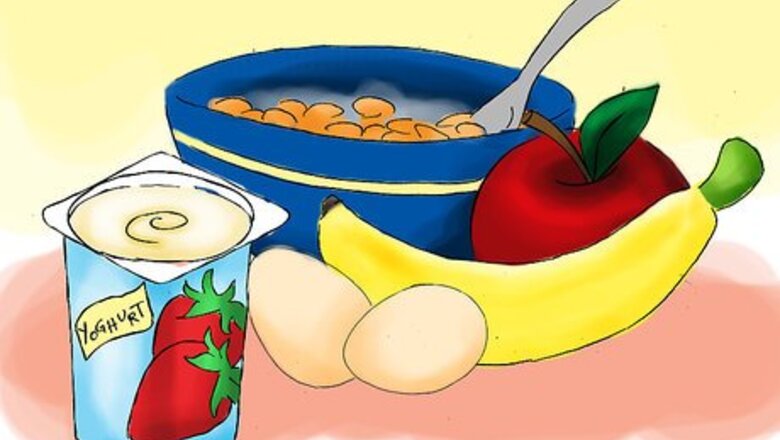
views
Making Healthy Eating Choices
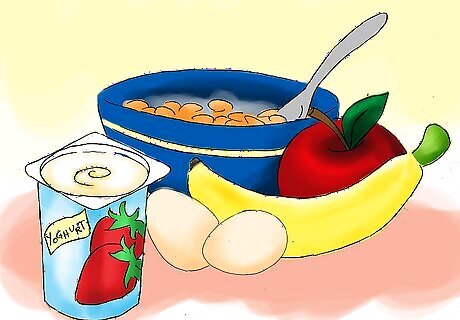
Eat breakfast every morning. Skipping breakfast is one of the worst things you can do for your body. Skipping breakfast has been connected to obesity, irritability, and reduced mental awareness. Breakfast is important, and you should always eat it, even if you have to wake up five to 10 minutes earlier or take it to work so you can eat it at your desk. Fix a healthy breakfast to start your day off right. Skip unhealthy breakfasts, like donuts, cake, pizza, or sugary cereals. Try healthy smoothies with fruit and proteins, like nut butters. You can eat healthy muffins, like these flax seed muffins or vegan chocolate walnut muffins. Take leftover steamed vegetables from the night before and a boiled egg or a piece of chicken. Eggs, avocado, and nuts are another good breakfast. You can try making your breakfast the night before.
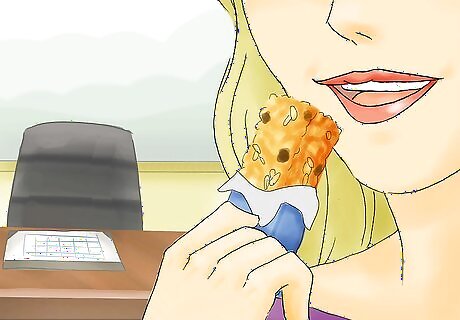
Take healthy snacks with you. Keeping healthy snacks at hand helps you avoid going too long without food, which can lead to unhealthy choices like a candy bar from the vending machine or fast food. Pre-portion these into one zip-lock bag for each day, to prevent over-eating. Fruit is some of the most portable, pre-portioned foods out there. Bring an apple, orange, or banana with you to boost your blood sugar during a busy day. Try healthy granola or fruit bars. Avoid bars with a lot of added sugars, hydrogenated oils, and unhealthy ingredients. Make your own granola bars if you can. Portable protein sources include mixed nuts, cheese sticks, jerky, and no-sugar-added nut butters.

Drink water. Staying hydrated is very important, and water is essential for your overall health. Plus, water doesn’t contain additives or extra sugars. When you are at your desk, switch out your calorie and sugar heavy sodas with water. Replacing just a few sodas each day with water will significantly lower the amount of calories and sugar you consume. You should drink eight eight-ounce glasses of water each day. Buy a reusable water bottle and keep it full and in your bag so you always have access to it. Try adding a dash of lemon or lime to the water, or drink natural seltzer waters.

Make smart choices when you eat out. No matter what you plan, you may find yourself going out to dinner or lunch with friends and co-workers, or maybe you are too busy and decide to go out. This doesn’t mean you just give up your healthy eating plan. Instead, make healthy choices by choosing a restaurant that serves healthy food or choosing a healthy entree. Choose health-focused restaurants when possible, include vegan, vegetarian, and all-natural locales. Search online or ask a server to find the nutrition information of the meals, or ask about "light" or healthy meals, such as grilled chicken or fish with a side of vegetables. Most restaurants offer larger portions than necessary. Consider having an appetizer as your meal, or splitting a meal with a friend. If you order a full entree, stop as soon as you are full and ask for the plate to be taken away (or put in a to-go box). Skip fried foods, fatty salad dressings and sauces, and other unhealthy items.
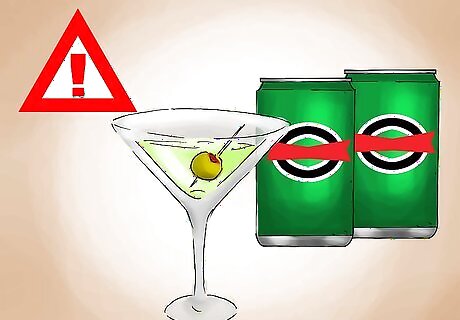
Limit alcohol. Alcohol adds calories and sugars to your daily diet. While a glass of red wine can be beneficial and an occasional beer or mixed drink won’t hurt, you should limit the amount of alcohol you consume on a daily basis. Dietary guidelines from the U.S. government recommend no more than one drink on a given day for women, or two drinks for men. In this system, one drink is 12 ounces of beer with 5% alcohol, 8 oz of 7% malt liquor, 5 oz of 12% wine, or 1.5 oz of 40% liquor. This means a large glass of wine or a tall cocktail could actually count as two drinks. When you go out with coworkers or friends, limit yourself to one drink after work. At night, consider replacing your nightly beers with a fruit and greens smoothie.
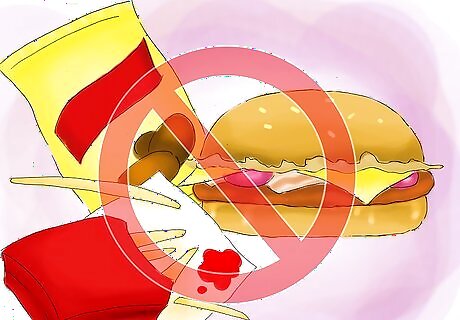
Remove junk food from the house. If the junk food is there, you will probably eat it. To help keep you from getting home from a long day and binge eating ice cream or chips, don’t buy any junk food. If it’s not there for you to eat, you can’t make bad choices when you are hungry and tired. Instead, keep healthy snacks around the house. Buy cottage cheese and pineapple instead of ice cream, or buy kale chips instead of potato chips.
Preparing Meals More Efficiently
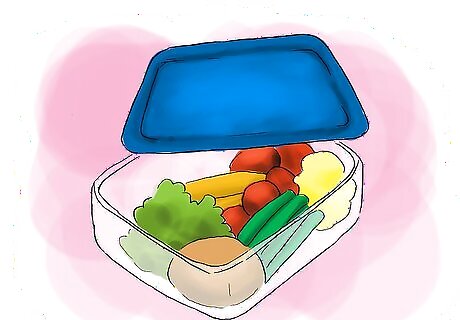
Do meal prep on the weekends. If you know that you will be working late every day, you should work on meal prep on the weekend. For example, separate vegetables and meat (raw or cooked) into single-serving portions. Freeze them in separate containers so you can easily and quickly combine ingredients into a stir fry or casserole. Make granola, homemade granola bars, breakfast muffins, or hard-boiled eggs to eat as snacks over the next few days. Instead of buying prepackaged unhealthy freezer meals, make large batches of food on the weekend that you can freeze for the week. Casseroles are great for freezing and heating back up. Search online for recipes that are great for freezing.
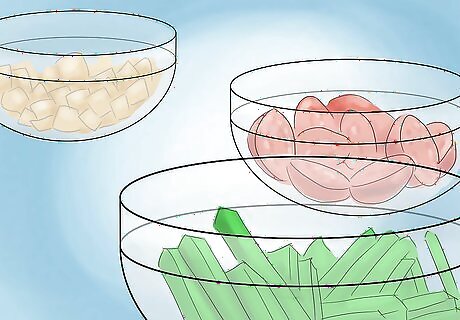
Buy pre-chopped food. If you don’t think you will have time to do meal prep on the weekends, buy your food already pre-chopped and pre-separated. You can find pre-cut veggies, like broccoli, cauliflower, or squash, individually wrapped cuts of meat, or pre-packaged fruit and nut butters. Go for healthy soup or side dish mixes to help make it easier. You can grab your pre-chopped ingredients to make a quick lunch or dinner, or take them as a snack.
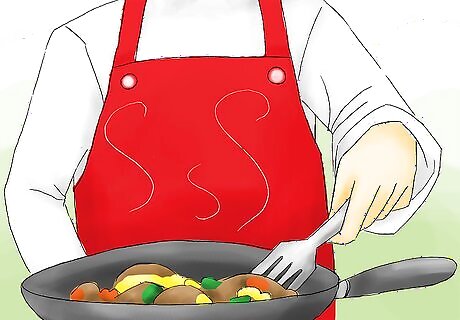
Cook meals in one dish. Sometimes cooking meals is time intensive because you have multiple dishes to make in multiple pots and pans. Instead, work on putting everything together in one pot. This might be a crock pot, a stove top pot, a wok, a skillet, or a casserole dish. For example, you can throw all your vegetables and some chicken or beef into a wok or skillet to make a stir fry or saute dish. Try putting meat, vegetables, and sauce into a casserole dish for a quick healthy meal. Most one pot meals make enough that you can carry leftovers for lunch or eat them the next night.
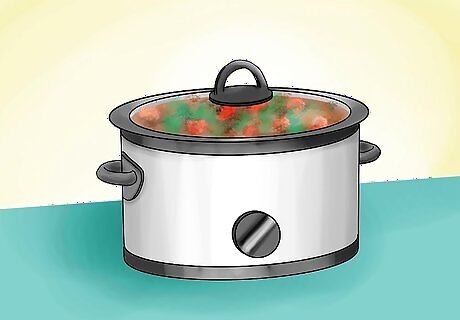
Use a slow cooker. Cooking with a slow cooker can save you a lot of time. You can throw your pre-chopped ingredients into the slow cooker in the morning, and then when you get home at night, dinner will be done. Slow cooker recipes can be healthy and delicious, and you can cook a wide variety of foods in one. Search online for slow cooker recipes. You don’t have to cook just chili or stew. You can cook just about anything in a slow cooker.
Divide the work with your household. If you live with someone who shares your healthy priorities, try alternating which nights you cook or pack lunches. Sharing the responsibility makes it easier to stick to a healthy diet when you are busy.
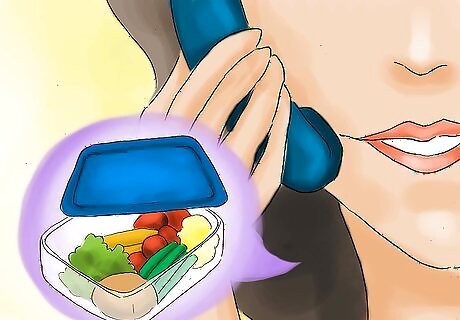
Try a food delivery service. If you are too busy to do your own shopping, have someone else do it for you. Many grocery stores offer delivery where you select your foods online and have them delivered straight to your door. You may also choose a healthy snack subscription service, where every month you get a box in the mail full of healthy, convenient snacks. There are also services that will deliver all the ingredients and the recipe for healthy meals to your door. All you have to do is put all the ingredients together and cook them. Though some of these services can be pricey, it may be worth the convenience of you having healthy foods delivered straight to your door so you don’t have to take the time to do it yourself.
Prepping For Healthier Eating
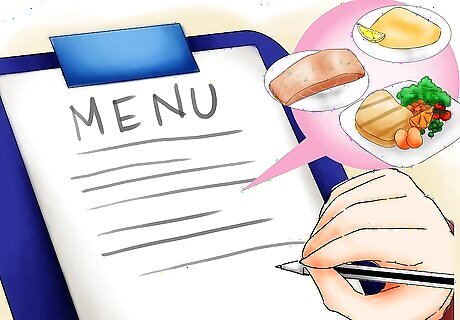
Create menus. Thinking ahead is a good way to eat healthy when you have a busy schedule. Look at the next week and decide what you want to eat for lunch and dinner every day. This can give you a sense of what you will need to take out of the freezer to thaw, what you need to prepare ahead of time, and save you the time of figuring out a meal on the fly. When you are hungry and get home after a long day, not knowing what you want to cook for dinner can lead to unhealthy decisions, like take-out. Instead, with a menu you will already know what you are going to cook. If there are days you get home later than others, you can plan easier meals or leftovers for those nights.

Make a grocery list. When you go grocery shopping for the week or month, you should take a list with you. This helps you have a clear plan for what you will eat. It also keeps you from buying random ingredients you don’t need, or ingredients that are not healthy for you. Instead, you will have a list of all your healthy ingredients to buy. Taking a grocery list also ensures that you have everything you will need for all of your meals for the week.

Stay dedicated to eating healthy. It is extremely easy to slip when we are busy. Having a dedication to your goal of eating healthy can help you maintain your plan and make healthier food choices. This can help you stay motivated even when you are busy. Taking just a moment to think “I want to eat healthy” can help you avoid slipping up and making a bad choice.




















Comments
0 comment